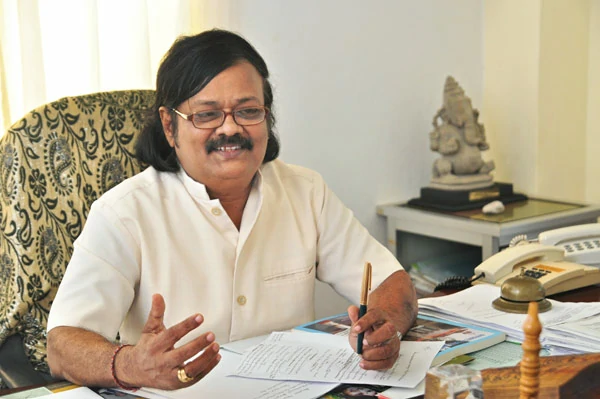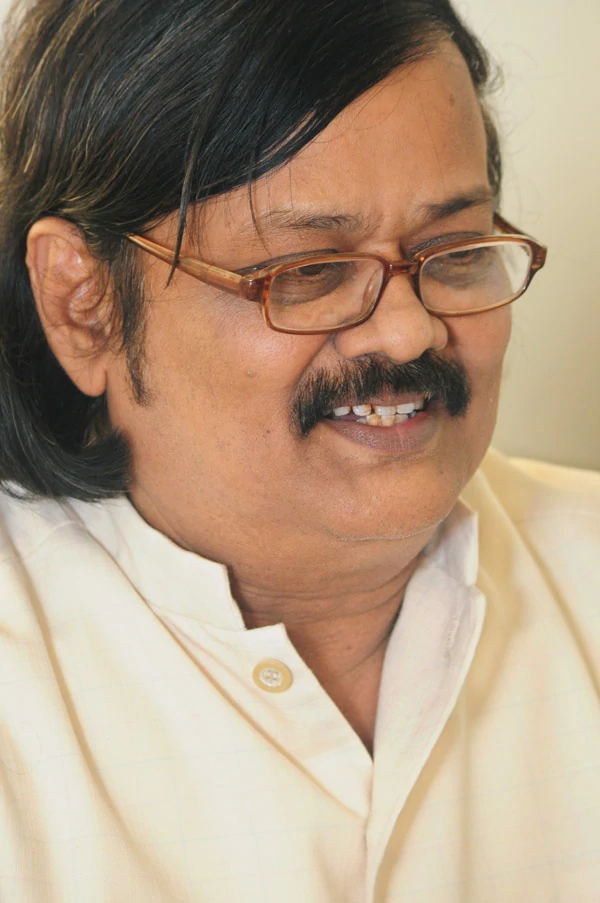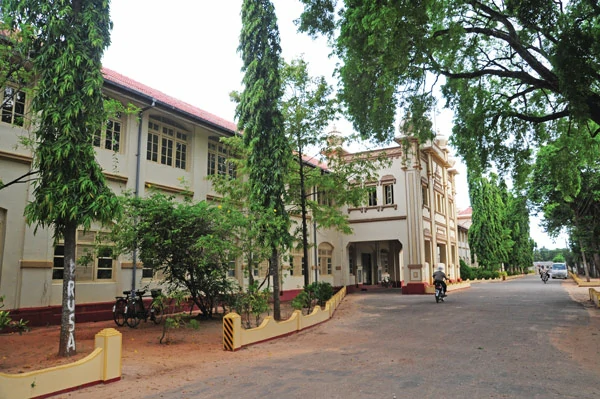
Established in 1974 as the Jaffna Campus of the University of Sri Lanka, the University of Jaffna has staunchly sustained through long periods of strife that prevailed through most part of its existence. The institution continues to serve not only its students, but also the community at large through a host of diverse programmes. Vice Chancellor of the University of Jaffna, Prof N Shanmugalingam, spoke to Business Today on the institution’s story and future aspirations.
By Prasadini Nanayakkara | Photography by Hiranya Malwatta
From your experience could you tell us about the University’s journey so far?
I have been with the University from 1981. I started as an assistant lecturer in Sociology, eventually to become the Professor of Sociology. I have been in this position as Vice Chancellor for the last two and a half years.
The University is 35 years old and Jaffna was affected by the war for 30 years, but I will gladly say that the University was able to sustain. Instead of using the term ‘survive’, I would say it sustained its education amidst the difficulties faced. We were able to progress in education and that has been the strength. It is not just the strength of the university, but of this culture that gives value to education. There is a kind of logic here that is, if the university gate is open only then will the schools of this area open and if the gates of the schools are open only then can the residents of Jaffna flourish – it’s all an interconnected network.
What are the student’s current expectations and how are they met here?
The primary expectation of the students is to complete their education. At present I have a cluster of students, some of whom are comfortable to come from home and study and another cluster of students that I myself have undertaken from the displaced camps. This is a very special category of students and in fact there are around 350 to 400 such students. Even within these students there are different categories including female students along with their own families needing accommodation and also those who have suffered losses and injuries.
Thus, there is a diverse range of students and therefore a wide range of expectations. Yet, education sustains hope. Negative acts and hopelessness have an adverse impact on this environment. So to answer your question, it is our aim to give students a good rehabilitation and reconciliation and a normal life for them and their families. The roots of these problems lie in history. However it is not altogether dependent on us. After the students graduate, they become the property of the entire community and they can then work towards the improvement of the country. However, only a real development in the country can provide real solutions to needs such as employment opportunities for these students.
What are the academic opportunities that the University offers and the improvements you are looking forward to?
We basically offer undergraduate programmes under the different faculties. Apart from the University of Jaffna, we also have a campus in Vavuniya. In Jaffna we have the Faculties of Science, Medicine, Agriculture, Management and Commerce, Arts and the Faculty of Graduate Studies. In Vavuniya we have two Faculties, Applied Science and Business Studies.
In one academic year, we have about 4,500 to 5,000 students, around 300 academic staff, but our non-academic staff is more than 1,000.
In offering these courses the brain drain has been a constraint, however we ensure the quality of our teaching programme. In this regard the visiting staff, for example the consultants from our Teaching Hospital are shouldering a big part of the responsibility. In spite of all this our students are shining and have reached the top in the merit list of Medicine in the recent past.
At the Management faculty we are going to introduce four different specialisations of BBA programmes from this year onwards. Those are Human Resource Management, Accounting, Marketing and Financial Management. In addition to the above under the Ramanathan Academy of Fine Arts, we offer Degrees in Bachelor of Fine Arts in Carnatic Music, Bharathanatiyam and Art and Design. Now we are hopeful to raise this to a Faculty status and we are awaiting the sanction for our proposal from the UGC. It must be mentioned that the Faculty will continue to cherish the name of Sir Ponnambalam Ramanathan, Philanthropist and Statesman who founded the schools of Parameswara College and Ramanathan College which formed the nucleus of our University.
There is a diverse range of students and therefore a wide range of expectations. Yet, education sustains hope. Negative acts and hopelessness have an adverse impact on this environment. It is our aim to give students a good rehabilitation and reconciliation and a normal life for them and their families.
The community engagement in this University is very high. We cannot be an ivory tower. In this regard we have many community extension study programmes and if you visit the University on a Saturday or Sunday you will find that these are as functional as weekdays. Extra Mural Studies, Human Resources Advancement (formally Workers Education), Physical Education, Fisheries Development are some of these units. Further there are programmes such as Media Literacy – the curriculum of which I designed, Gender Studies, Office Management and many other socially relevant areas.
These are the opportunities available for those who missed the university education. Recently we signed an MOU with the Management Institute of Northern Province and began the training of officials in the following areas, Project Planning, Community Development and English for Communication.
In addition we also have some interesting postgraduate programmes as well under our Faculty of Graduate Studies, which are unique, and again dealing with community engagement, helping the public administration and cultural development. I am the founder and the coordinator of the MA programme in Cultural Studies which gives special emphasis to cultural anthropology. Similarly we have a programme on Regional Planning, Public Administration, Development Studies and Population Development Studies. Last year we introduced two new study programmes which focus on the cultural heritage of Jaffna; MA in Tamil and MA in Saiva Siddhandam which is the living religious and philosophical school of Jaffna cultural tradition.
Could you talk about the interest shown for such courses?
I assessed the interest for MA in Saiva Sidhandam during the recent Convocation and there were graduates over 60 years of age as well. This time for the Master of Education there were 1,500 applications. With the opening of A9 the number has increased. Further we are hoping to incorporate a degree programme using the online learning programme of BBM under the distance learning modernisation project of Asian Development Bank.
What are the employment opportunities these courses offer?
Most of those who follow these postgraduate courses are already employed and gave them opportunities to better their prospects in career development. The feedback from the employers indicates the quality changes among these students. More than this, it also facilitated the interaction with our undergraduate students to gain solutions to the problems they identified in their village stream.
Another significant factor is the cost of these self financing courses are very minimal, again with community development interest in mind.
Our dreams are limitless.Our journey of achievements has been with a lot of courage and challenges from the time of our founder… We continue to carry and cherish the tradition of education.
What are the needs that have to be met for the development of the University?
If you take the Faculty of Agriculture, it has been displaced since 1990. It is currently functioning in rented houses in Jaffna. One of my prime targets is to reinstate the Faculty to its original place in Kilinochchi, for which the land is already available but the funds are needed to complete the planned infrastructure development. We are presently engaged in this. The Allied Health Sciences is also a priority, where we need to provide the infrastructural facilities and then the commencement of the Faculty of Engineering is another awaited dream.
What are your thoughts for the future?
Our dreams are limitless. Our journey of achievements has been with a lot of courage and challenges from the time of our founder President, Prof Kailasapathy, the first Vice Chancellor Prof Vithiananthan, to myself. We continue to carry and cherish the tradition of education along with the University community which has always joined hands in our endeavors. In the present space of transformation, we have to give hope and courage to our students through all our activities, and we are moving through such moments and events. I would like to underline the recent convocation of our graduates after a lapse of nearly five years. The event took 15 sessions lasting three days in a ritualistic atmosphere. All our students from all parts of the country regardless of any differences gathered to cherish this heritage of University tradition.
I would like to conclude this interview with my message to our students in my Convocation address:
“It is really a new beginning for all of you and we are confident that you will fulfil our vision and dream being an energetic, socially engaged, committed and doggedly determined personality. Enrich your life and contribute to the betterment of human and social development.”
This is not only a message to our students but a greeting for all the students who are engaged in the sphere of higher education.







